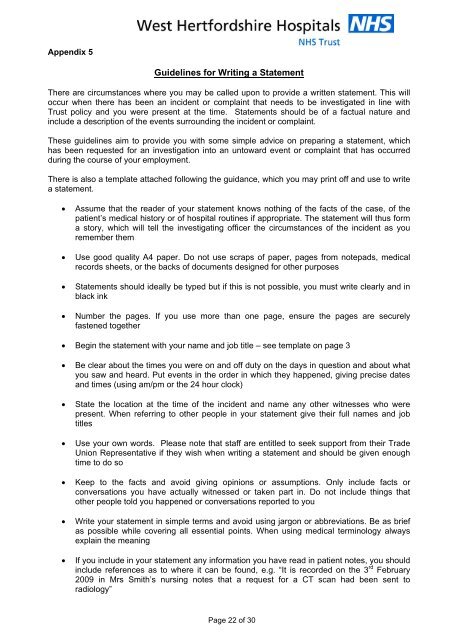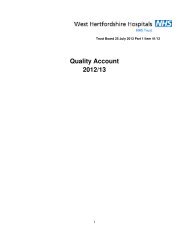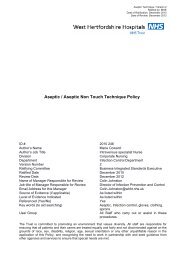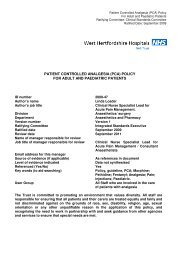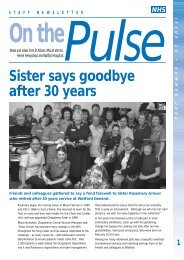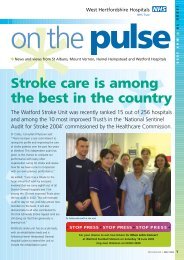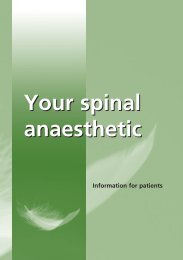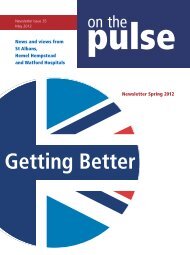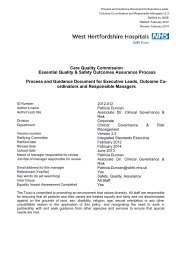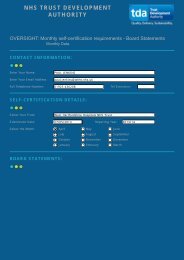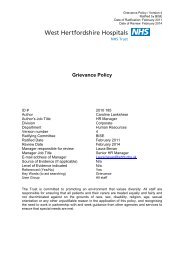disciplinary policy & procedure - West Hertfordshire Hospitals NHS ...
disciplinary policy & procedure - West Hertfordshire Hospitals NHS ...
disciplinary policy & procedure - West Hertfordshire Hospitals NHS ...
You also want an ePaper? Increase the reach of your titles
YUMPU automatically turns print PDFs into web optimized ePapers that Google loves.
Appendix 5<br />
Guidelines for Writing a Statement<br />
There are circumstances where you may be called upon to provide a written statement. This will<br />
occur when there has been an incident or complaint that needs to be investigated in line with<br />
Trust <strong>policy</strong> and you were present at the time. Statements should be of a factual nature and<br />
include a description of the events surrounding the incident or complaint.<br />
These guidelines aim to provide you with some simple advice on preparing a statement, which<br />
has been requested for an investigation into an untoward event or complaint that has occurred<br />
during the course of your employment.<br />
There is also a template attached following the guidance, which you may print off and use to write<br />
a statement.<br />
• Assume that the reader of your statement knows nothing of the facts of the case, of the<br />
patient’s medical history or of hospital routines if appropriate. The statement will thus form<br />
a story, which will tell the investigating officer the circumstances of the incident as you<br />
remember them<br />
• Use good quality A4 paper. Do not use scraps of paper, pages from notepads, medical<br />
records sheets, or the backs of documents designed for other purposes<br />
• Statements should ideally be typed but if this is not possible, you must write clearly and in<br />
black ink<br />
• Number the pages. If you use more than one page, ensure the pages are securely<br />
fastened together<br />
• Begin the statement with your name and job title – see template on page 3<br />
• Be clear about the times you were on and off duty on the days in question and about what<br />
you saw and heard. Put events in the order in which they happened, giving precise dates<br />
and times (using am/pm or the 24 hour clock)<br />
• State the location at the time of the incident and name any other witnesses who were<br />
present. When referring to other people in your statement give their full names and job<br />
titles<br />
• Use your own words. Please note that staff are entitled to seek support from their Trade<br />
Union Representative if they wish when writing a statement and should be given enough<br />
time to do so<br />
• Keep to the facts and avoid giving opinions or assumptions. Only include facts or<br />
conversations you have actually witnessed or taken part in. Do not include things that<br />
other people told you happened or conversations reported to you<br />
• Write your statement in simple terms and avoid using jargon or abbreviations. Be as brief<br />
as possible while covering all essential points. When using medical terminology always<br />
explain the meaning<br />
• If you include in your statement any information you have read in patient notes, you should<br />
include references as to where it can be found, e.g. “It is recorded on the 3 rd February<br />
2009 in Mrs Smith’s nursing notes that a request for a CT scan had been sent to<br />
radiology”<br />
Page 22 of 30


